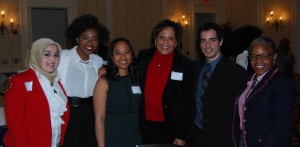
Research is driven by inquiry, so I pause to ask, “What kind of graduate school would my graduate school be, if everyone in the graduate school were just like me?” If we throw aside the false notions that we are ideal, perfect individuals, then this question raises serious implications. My own reflection on a response to this question yields a very poignant reality that a graduate school full of “me” would be boring, unfruitful, and unproductive. We would all be political scientists. There would be no interest in microbiology, genetics, art history, or sociology for that matter. Furthermore, we would all ask the same questions and we would only be interested in the subfield of comparative politics within political science. A group of “me” would be a sad reality for contributions to and advancements in the humanities, medicine, and technology, for example.
On the contrary, I thrive in an environment where people come from all walks of life. We bring different ideas to the table. We like different things (though we may share common bonds). Our backgrounds and interest help shape a world of varied interests. We recover lost constitutions. We find implications for the human heart from zebrafish. We bring light to Faulkner.
So, the next time you are asked to talk to prospective students who may not look, sound, talk just like you, or when you are challenged by the notion of diversity, revisit the question above. What you will discover is that promoting diversity has broad resonance and benefits for us all.